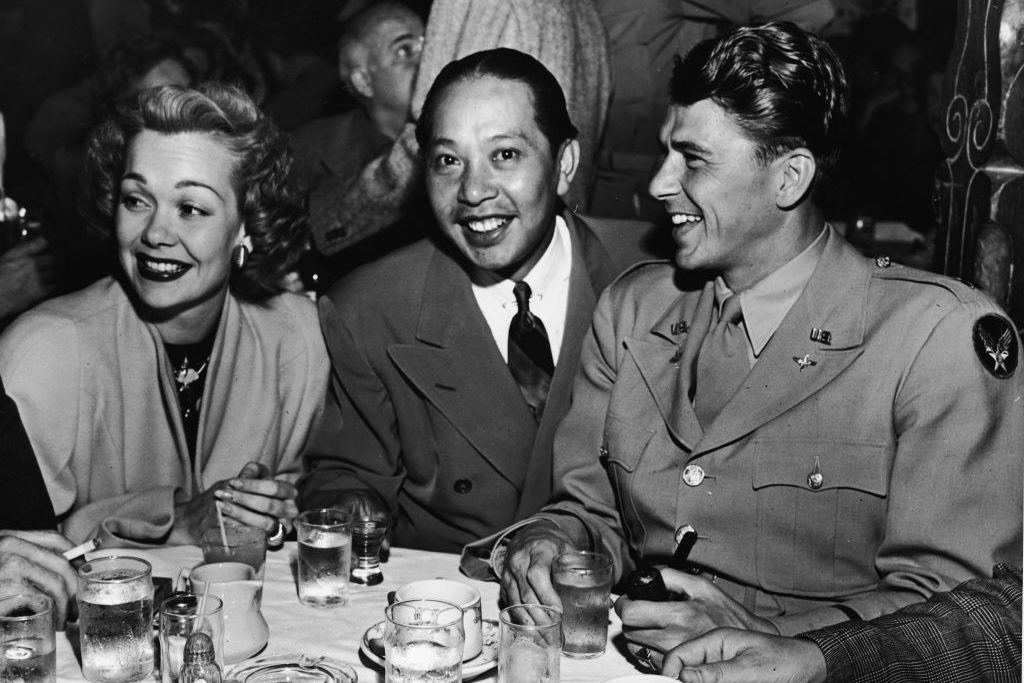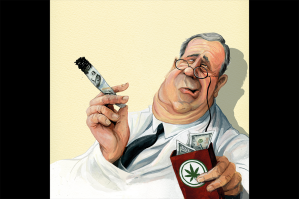Squinting through the penumbra of blue smoke that is nearly always contiguous with my person, I was surprised — no, scandalized — to see a silly little remark about G.K. Chesterton stud the pages of the National Review this week.
Chesterton, that many-sided genius, once had the gall to defend the practice of torching a nice clump of tobacco and inhaling the fumes. Here is what he wrote, many years ago:
‘…to have a horror of tobacco is not to have an abstract standard of right; but exactly the opposite. It is to have no standard of right whatever; and to take certain local likes and dislikes as a substitute.’
And here are our friends Jack Butler and Alec Dent in the Review:
‘To Chesterton, concern for one’s health was a poor substitute for morality — never mind that the two are not mutually exclusive, or that there might be a duty not to harm oneself. We shall not dwell on the fact that Chesterton weighed 286 pounds as an adult and died at age 62.’
I never thought I would live long enough to see G.K. Chesterton, of all men, fat-shamed in America’s finest conservative magazine, but here we are.
Of course, Chesterton’s gloriously elephantine figure is not the reason we are here. We are here because Mr Butler and Mr Dent are unhappy about smoking, smokers and the suggestion — made by myself and my colleague Bill McMorris — that smoking is a Good Thing.
Boldly returning from the most obscure zones of scientific research and avant-garde medical practice, Mr Butler and Mr Dent are here to let us know that smoking is, in fact, bad for one’s health.
The mind-expanding revelations keep coming: tobacco companies, Mr Butler and Mr Dent have discovered, make a profit from selling unhealthy products. Smoking is not manly (sure) and is neither conservative, nor the democratic activity that it’s defenders claim it is.
Mr Butler and Mr Dent round off their piece with the charming suggestion that non-smokers ought to continue to make smokers ‘go outside’. I suppose the spirit of Puritanism will continue to howl through certain American minds as long as there is an America.
One of my gravest sins appears to be the suggestion that smoking supports independence of mind. This is how I described the connection between the French novelist Michel Houellebecq’s dedicated smoking and the acuity of his prose, back in January:
‘Houellebecq… is a serious smoker. Here is a man who looks as if he lights each cigarette with the butt of the last cigarette, somebody who began mainlining Gauloises…as a toddler. That he is able to understand Trump’s presidency with more clarity and style than the likes of Ezra Klein and Jonah Goldberg is a testament to the inspirational power of a fine, earthy, combustible tobacco blend.’
Mr Butler and Mr Dent think this a poor argument. Just because some clever people smoke, it does not follow that all people who smoke will be clever. Well, duh. I was not seriously suggesting that if we parachute carton after carton of Rothmans into the nation’s public schools that we’ll engineer a generation of Mozarts and Plancks.
But do I believe there is a relationship, however small, between expression, risk-taking, conviviality, imagination, autonomous thinking and constant doses of nicotine? Well, I merely have to think of Bach professing both his sincere faith in God and the trust he put in his pipe. I simply picture George Orwell rolling yet another cigarette. I see Virginia Woolf polishing off the last few sentences of To The Lighthouse with a cheroot gracing the corner of her mouth. I think of the truth and justice in Eric Maria Remarque’s reminiscence:
‘Someone said to me once that a cigarette at the right moment is better than all the ideals in the world.’
Perhaps they would all have been better off going to the gym regularly, starting a podcast and replacing all the smokes with turmeric lattes.
Whenever I’m perched on a park bench, reading something crude and badly-written (The New York Times, say) heroically working my way through a deck of cigarettes, I’m always astonished to see so many runners. The harrowing rotation of their jowls as they stampede around the place; the dumb, expensive webbed costumes they wear; the masochistic addiction they’ve developed to two of the worst things in life: boredom and pain.
What exactly are they running from? What is the mad rationalism that makes people monitor their every heartbeat as they jog? Do they think it’s possible to be healthy forever?
As the late Simon Leys pointed out, there is a respect in which smokers enjoy a certain spiritual superiority over non-smokers, as ‘they are more immediately aware of our common mortality’. Leys goes on:
‘The warning that, by law, must now be printed on all tobacco products unwittingly echo a beautiful ancient ritual of the Catholic Church: on Ash Wednesday, as every faithful is marked on the forehead with the blessed ashes, the priest reminds him, “Remember that you are dust and to dust you will return.”’
Modernity does its best strangle such thoughts. An awareness of our common frailty. An understanding that all things must pass, particularly human things. A consciousness that as a species we are less likely to perfectly follow the advice of theorists and doctors, and more likely to cherish and cultivate small habits, even when such habits are irrational. All of us, in the end, will return to dust.
For Mr Butler and Mr Dent who say there is nothing inherently conservative about cigarettes. I would suggest they have everything backwards.



















